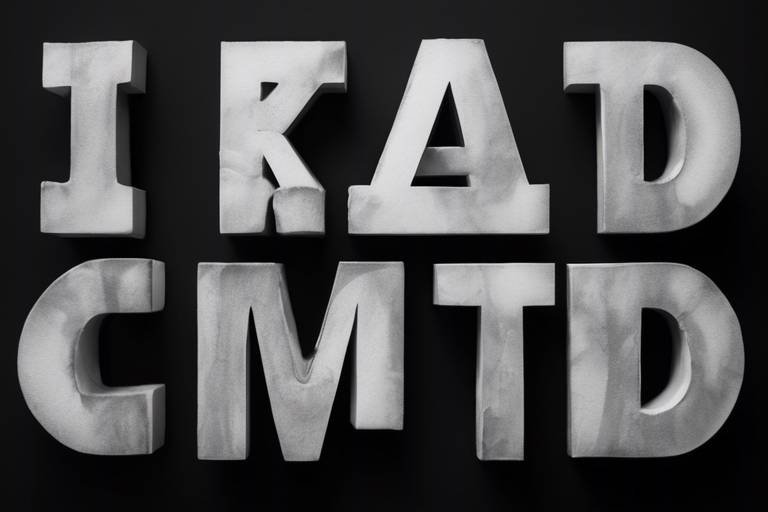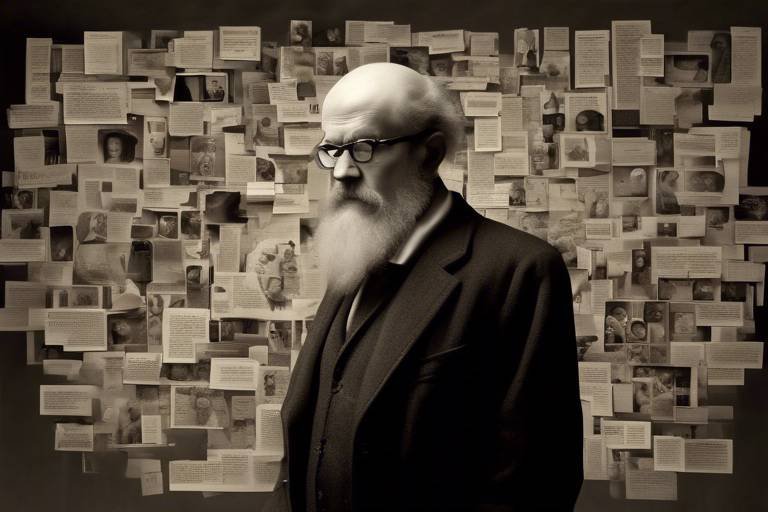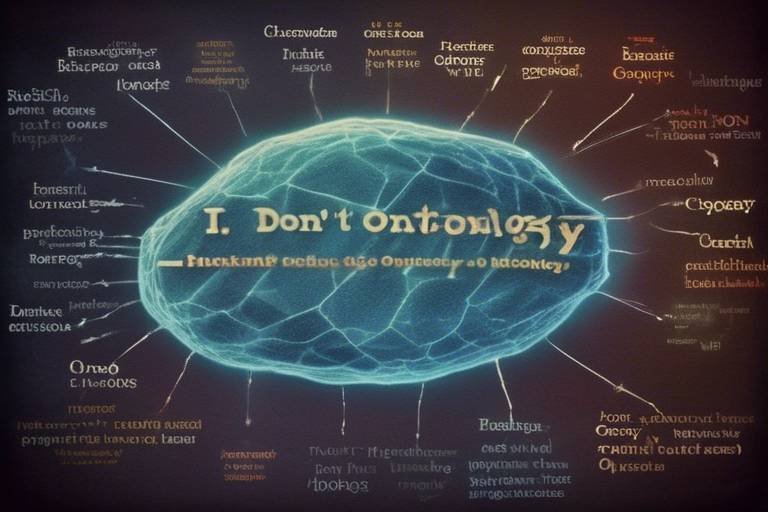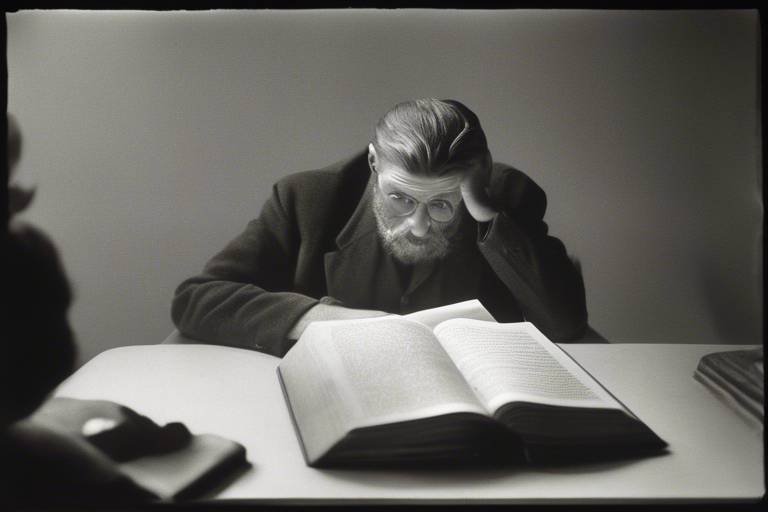A Brief Introduction to Ontological Commitment
Welcome to the intriguing world of ontological commitment, a concept that might sound complex at first but is essential for understanding various philosophical discussions. At its core, ontological commitment refers to the assumptions we make about what entities exist within a particular theory or discourse. Think of it as the philosophical backbone that supports our understanding of reality. Without these commitments, our discussions about existence would be like trying to build a house without a foundation—unstable and unreliable.
So, why does ontological commitment matter? Well, it plays a crucial role across multiple fields, including logic, linguistics, and metaphysics. For instance, when we engage in logical reasoning, we often need to clarify what kinds of entities we are talking about. Are we discussing physical objects, abstract concepts, or perhaps even fictional characters? Each of these categories comes with its own set of ontological commitments that influence how we interpret and understand arguments. It's like having a map that guides us through the terrain of thought; without it, we could easily get lost in a maze of ideas.
Moreover, ontological commitments are not just theoretical musings; they have real-world implications. Consider how we use language to communicate. The words we choose often reflect deeper assumptions about the world around us. When someone says, "Unicorns are magical," they are implicitly making an ontological commitment to the existence of unicorns, even if they are using them as a metaphor. This interplay between language and existence is a fascinating area of study that reveals much about our cognitive processes.
In this article, we will delve deeper into the nuances of ontological commitment, exploring its historical context, key philosophers who have shaped the debate, and its applications in logic and linguistics. We'll also address critiques and challenges that arise within this discourse, providing a comprehensive overview that aims to demystify this essential philosophical concept. So, buckle up, and let's embark on this intellectual journey together!
- What is ontological commitment?
Ontological commitment refers to the assumptions made about what entities exist in a particular theory or discourse.
- Why is it important?
It helps clarify discussions in various fields like logic, linguistics, and metaphysics, guiding our understanding of existence.
- Who are the key philosophers associated with this concept?
Philosophers like Willard Van Orman Quine and Gottlob Frege have made significant contributions to the understanding of ontological commitment.
- How does it relate to language?
Our linguistic choices often reflect deeper ontological commitments, influencing how we communicate and interpret meaning.

Understanding Ontological Commitment
Ontological commitment is a fascinating concept that dives deep into the essence of what we believe exists in our theories and discussions. At its core, it asks the question: what entities do we assume are real when we make statements about the world? This commitment isn't just a philosophical abstraction; it has real implications across various disciplines, including logic, linguistics, and metaphysics. By unpacking this term, we can gain insights into how our beliefs shape our understanding of reality.
To grasp ontological commitment, we need to consider it as a framework of assumptions. When a philosopher or a scientist proposes a theory, they are inherently making claims about what exists. For instance, if a physicist talks about electrons, they are committed to the existence of these particles in their theoretical framework. This commitment can be explicit or implicit, but it plays a crucial role in how theories are constructed and evaluated.
One way to think about ontological commitment is through the lens of a map versus territory analogy. Imagine a map that represents a city. The map includes roads, parks, and buildings, but it’s not the city itself. Similarly, a theory is a map of our understanding of reality, and the entities we commit to are the landmarks on that map. If we change the map—say, by adding new roads or removing old ones—we might also change what we believe exists in the city. This dynamic nature of ontological commitment means that as our theories evolve, so too do our commitments to certain entities.
In philosophical discourse, ontological commitment often intersects with debates about existence. Consider two competing theories: one that posits the existence of abstract entities like numbers and another that denies their existence. Each theory carries its own ontological commitments, leading to different conclusions about what can be said to exist. This interplay between theory and commitment is what makes ontological discussions so rich and complex.
Moreover, ontological commitment is not just a dry philosophical topic; it has practical implications in our everyday lives. For example, when we engage in conversations about morality, existence, or even the nature of the universe, we are often revealing our ontological commitments. Are we assuming that moral values exist independently of human opinion? Do we believe in the existence of a physical universe outside our perceptions? These fundamental questions shape our worldview and influence how we interact with each other.
In summary, understanding ontological commitment is essential for anyone looking to navigate the intricate landscape of philosophy and its applications. It prompts us to reflect on our assumptions about existence and encourages a deeper exploration of the theories that shape our understanding of reality. By recognizing the entities we commit to, we can better appreciate the frameworks we use to interpret the world around us.

The Historical Context
Ontological commitment has a rich and fascinating history that stretches back to the early days of philosophical inquiry. It is not merely a modern construct but rather a concept that has evolved through the ages, shaped by the thoughts and theories of numerous influential philosophers. Understanding this historical context is essential for grasping the nuances of ontological commitment today.
In ancient philosophy, thinkers like Plato and Aristotle laid the groundwork for discussions about existence and reality. Plato’s theory of forms suggested that non-material abstract forms, or ideas, represent the most accurate reality. In contrast, Aristotle focused on concrete entities and their properties, emphasizing the importance of substance in understanding existence. These early explorations set the stage for later debates about what it means to be committed to certain entities or categories of existence.
Fast forward to the 20th century, and we encounter pivotal figures like Gottlob Frege and Willard Van Orman Quine, who brought ontological commitment to the forefront of philosophical discourse. Frege’s work on sense and reference introduced a critical distinction that would influence how philosophers think about meaning and existence. He argued that understanding a statement involves not just knowing what it refers to but also grasping its sense, or the way it presents its reference. This distinction has profound implications for ontological commitment, as it suggests that our linguistic practices inherently reflect our commitments to certain types of entities.
Quine, on the other hand, took a more radical approach. His famous indispensability argument posits that we are ontologically committed to the existence of entities that our best scientific theories require. In his view, if a theory necessitates the existence of certain objects to make sense of its claims, then we must accept those objects as part of our ontology. This idea challenged traditional perspectives and pushed philosophers to reconsider their assumptions about existence in light of scientific inquiry.
Throughout this historical journey, several key debates have emerged regarding the nature of ontological commitment. For instance, the question of whether existence is a property in itself or merely a quantifier has sparked extensive discussions. Philosophers have grappled with whether we should adopt a realist stance, asserting that entities exist independently of our thoughts, or a more nominalist view, which denies the independent existence of abstract entities.
To further illustrate the evolution of ontological commitment, let’s take a look at a brief timeline of significant milestones:
| Time Period | Philosopher | Contribution |
|---|---|---|
| 4th Century BCE | Plato | Theory of Forms |
| 4th Century BCE | Aristotle | Substance and Essence |
| 19th Century | Gottlob Frege | Sense and Reference |
| 20th Century | Willard Van Orman Quine | Indispensability Argument |
This timeline highlights the progression of thought surrounding ontological commitment and how it has been influenced by various philosophical movements. Each philosopher brought their unique insights and challenges, contributing to a dynamic and ongoing discussion that continues to evolve today.
In summary, the historical context of ontological commitment reveals a tapestry of ideas woven together by the contributions of many thinkers. From the ancient Greeks to modern philosophers, each has played a role in shaping our understanding of existence and the commitments we make in our theories and language. As we delve deeper into the implications of ontological commitment in various fields, it's essential to keep this rich history in mind, as it informs contemporary debates and discussions.

Key Philosophers and Theories
When diving into the intricate world of ontological commitment, we can't overlook the pivotal contributions made by key philosophers throughout history. Their ideas not only shaped the discourse around existence but also laid the groundwork for modern philosophical inquiry. Let's take a closer look at some of these influential thinkers and their theories.
One of the most significant figures in this realm is Willard Van Orman Quine. Quine's work, particularly his Indispensability Argument, posits that we are ontologically committed to the existence of entities that our best scientific theories necessitate. This means that if a scientific theory requires the existence of certain objects or entities to explain phenomena, then we must accept that those entities exist. For instance, if a theory in physics relies on the concept of electrons to explain electrical phenomena, then we are committed to the existence of electrons. This perspective challenges the traditional view of ontology by merging it with scientific practice, suggesting that our understanding of what exists is deeply intertwined with our scientific theories.
Another key philosopher, Gottlob Frege, introduced crucial distinctions that have shaped our understanding of language and meaning in relation to ontological commitment. His theories on sense and reference provide a framework for distinguishing between the meaning of a term (its sense) and the actual object it refers to (its reference). For example, the term "the morning star" and "the evening star" refer to the same entity (Venus) but have different senses. This distinction is vital because it influences how we comprehend existence claims in language. Frege's insights encourage us to consider not just what we talk about but also how we talk about it, shedding light on the implications of our linguistic choices on our ontological commitments.
In contemporary discussions, philosophers often grapple with the implications of these foundational theories. For example, Quine's challenge to the analytic-synthetic distinction forces us to reconsider how we approach knowledge and existence. Are there entities we can claim exist independently of our theories, or are all existence claims inherently tied to the frameworks we use to understand the world? This ongoing debate highlights the dynamic nature of ontological commitment and its relevance across various domains.
To summarize, the contributions of philosophers like Quine and Frege have profoundly impacted our understanding of ontological commitment. Their theories not only illuminate the relationships between language, science, and existence but also invite us to engage in a deeper inquiry about what it means to claim something exists. As we navigate these philosophical waters, it becomes clear that our commitments shape not only our theories but also our everyday understanding of reality.

Quine's Indispensability Argument
Quine's Indispensability Argument is a cornerstone in the discussion of ontological commitment, emphasizing the necessity of certain entities in our best scientific theories. At its core, the argument suggests that if a theory is indispensable to our understanding of the world, then we are committed to the existence of the entities that the theory posits. This idea is not just a philosophical musing; it has real implications for how we approach scientific inquiry and the nature of reality itself.
Imagine you’re building a house. You wouldn’t just throw together bricks and wood without considering the blueprints. Similarly, Quine argues that our scientific theories serve as blueprints for understanding existence. If a theory requires certain entities—like electrons or gravitational fields—then we must accept that these entities exist if we want our theories to hold water. This assertion challenges us to rethink how we perceive existence and the criteria we use to validate the reality of entities.
Quine's argument can be broken down into a few key points:
- Indispensability: If a theoretical entity is essential for the success of a scientific theory, then we must accept its existence.
- Ontological Commitment: Our commitment to existence is directly tied to the tools we use to explain the universe.
- Pragmatic Acceptance: We accept the existence of entities not based on direct observation but rather on their utility in explaining phenomena.
For instance, consider the role of mathematical entities in physics. Quine would argue that if our best physical theories rely on mathematical constructs—like numbers or geometric shapes—then we are ontologically committed to those mathematical entities. This perspective pushes against the traditional view that existence is only tied to physical objects we can see or touch. Instead, it opens up a broader understanding of what it means to 'exist' in a scientific context.
Moreover, Quine's argument has sparked significant discussions about the relationship between ontology and epistemology. By asserting that our understanding of existence is contingent upon our scientific frameworks, he invites us to explore how knowledge shapes our beliefs about what is real. This interplay between knowledge and existence raises questions about the nature of truth itself: can something be true if it cannot be observed or measured?
In summary, Quine's Indispensability Argument not only challenges our traditional notions of existence but also redefines the landscape of philosophical inquiry. It compels us to consider the entities we take for granted in our scientific theories and the implications of those assumptions. As we navigate through the complexities of existence, Quine’s insights remain a guiding force, urging us to confront the depths of our ontological commitments.

Frege's Sense and Reference
Friedrich Ludwig Gottlob Frege, a pivotal figure in the realm of philosophy and logic, introduced a groundbreaking distinction between sense and reference that has profound implications for understanding ontological commitment. At its core, this distinction seeks to clarify how we engage with language and the entities it represents. The sense of an expression pertains to the way in which a reference is presented, while the reference itself is the actual entity that the expression denotes. This differentiation is not merely a linguistic quibble; it fundamentally alters how we perceive existence claims within philosophical discourse.
To illustrate this, consider the example of the morning star and the evening star. Both terms refer to the same celestial body—Venus. However, the sense of each term is different: the morning star evokes the image of Venus as seen at dawn, while the evening star invokes its appearance at dusk. This leads to an intriguing conclusion about ontological commitment: when we assert the existence of something, we are not only committing to the reference but also to the sense through which we understand that reference. In this way, Frege's insights challenge us to consider not just what exists, but how our understanding of existence is shaped by the senses we employ.
Frege's work invites us to reflect on the implications of sense and reference in various fields, including logic and semantics. For instance, in logical systems, the precision of language is paramount. If we cannot distinguish between the sense and reference of a term, our logical deductions may falter. This is particularly critical in formal logic, where clarity is essential to avoid ambiguity. Thus, Frege's ideas encourage us to delve deeper into the connections between language, thought, and reality, prompting questions like: How do our linguistic choices influence our ontological commitments? Are we aware of the senses we invoke when we discuss abstract concepts?
Moreover, Frege's distinction has implications for semantic theories. In truth-conditional semantics, for example, understanding how a sentence relates to the world hinges on grasping both the sense and reference. A failure to appreciate this duality can lead to misunderstandings about what is being claimed in any given discourse. Consequently, Frege's framework not only enriches our comprehension of language but also adds layers to the ongoing debates about existence and reality.
In summary, Frege's exploration of sense and reference is not just a theoretical exercise; it has real-world implications for how we articulate our ontological commitments. By recognizing the interplay between what we mean (sense) and what we refer to (reference), we can navigate the complexities of language and thought with greater clarity. This understanding is crucial as we engage with philosophical discussions that seek to unravel the mysteries of existence and the entities that populate our theories.
- What is the difference between sense and reference? Sense refers to the way an entity is presented, while reference is the actual entity itself.
- How does Frege's distinction impact philosophy? It challenges philosophers to consider not just what exists but how our understanding of existence is shaped by language.
- Why is this distinction important in logic? It helps clarify the meanings of terms, ensuring that logical deductions are precise and unambiguous.

Ontological Commitment in Logic
When we dive into the realm of logic, the concept of ontological commitment takes on a fascinating role. At its core, ontological commitment within logical frameworks is about understanding what entities we are presupposing or affirming when we construct our logical systems. It’s like peering through a lens that helps us see the underlying assumptions about existence that we might otherwise overlook. Think of it as the invisible scaffolding that supports the entire structure of logical reasoning.
In formal logic, ontological commitment is often tied to the existential quantifier. This quantifier allows us to express that there exists at least one entity that satisfies a given property. For example, in the statement “There exists an x such that x is a cat,” we are not just making a claim about a property of x; we are also committing to the existence of at least one entity that fits this description. This leads to some intriguing implications: if our logical system employs certain quantifiers, we are, in essence, acknowledging the existence of the entities they refer to.
Moreover, when we analyze various logical systems—like predicate logic or modal logic—we start to see how ontological commitments can differ significantly. Each system has its own set of rules and assumptions about existence. For instance, while classical logic may commit to a straightforward interpretation of existence, modal logic introduces a more nuanced approach, allowing for discussions about possible worlds and the entities that might exist in those alternate realities. This brings us to the question: are we committed to entities that exist merely in potentiality, or only to those that exist in actuality?
To illustrate this point, let’s consider a simple table that highlights the differences in ontological commitments across various logical systems:
| Logical System | Ontological Commitment | Example |
|---|---|---|
| Classical Logic | Commits to actual entities | "There is a unicorn" implies a commitment to the existence of unicorns. |
| Predicate Logic | Commits to entities satisfying predicates | "There exists an x such that x is a philosopher" commits to at least one philosopher. |
| Modal Logic | Considers possible entities | "It is possible that there exists a dragon" allows commitment to potential existence. |
As we explore these logical systems, it becomes clear that ontological commitment is not merely an abstract concept; it has profound implications for how we understand truth and existence. When philosophers and logicians debate the nature of reality, they often engage with the ontological commitments underlying their arguments. This engagement can lead to rich discussions about what it means for something to exist and how we can meaningfully talk about entities in different contexts.
In conclusion, ontological commitment in logic serves as a crucial bridge connecting our linguistic expressions with our metaphysical assumptions. It challenges us to consider not just what we say, but what we are implicitly affirming about the world around us. As we continue to explore the depths of logic and philosophy, recognizing these commitments will help us navigate the complex landscape of existence and meaning.
- What is ontological commitment? Ontological commitment refers to the assumptions made about what entities exist in a particular theory or discourse.
- How does ontological commitment relate to logic? In logic, ontological commitment involves understanding what entities we are presupposing when we construct logical systems.
- Why is ontological commitment important? It helps clarify the assumptions underlying logical arguments and can influence our understanding of truth and existence.

Applications in Linguistics
When we think about ontological commitment, it’s easy to get lost in the abstract philosophical discussions. However, its applications in linguistics are both fascinating and crucial for understanding how we communicate. At its core, ontological commitment in linguistics revolves around the entities we refer to in our language and how these references shape our understanding of meaning. Imagine trying to explain a concept without a shared understanding of the entities involved; it would be like trying to build a house without a foundation. This is where ontological commitment plays a pivotal role.
One of the key aspects of ontological commitment in linguistics is its influence on reference and meaning. When we utter a sentence, we are not just stringing words together; we are making claims about the world. For instance, consider the sentence "Unicorns are mythical creatures." Here, the speaker is committing to the existence of 'unicorns' in a particular way—acknowledging that they exist in the realm of mythology, even if not in reality. This act of commitment is fundamental to how we convey meaning and understand each other. Without a shared ontological framework, communication would break down, leading to confusion and misinterpretation.
Furthermore, ontological commitments influence how we interpret semantic theories. For example, in truth-conditional semantics, the meaning of a sentence is closely tied to the conditions under which it would be true. This necessitates a clear understanding of the entities involved. If we claim "The cat is on the mat," we are implicitly committing to the existence of both 'the cat' and 'the mat'. This relationship between language and existence is not just a theoretical concern; it has real implications for how we understand and use language in everyday life.
Moreover, the implications of ontological commitment extend beyond mere semantics; they touch on the very structure of linguistic theories. For instance, consider how different languages might encode ontological commitments differently. Some languages have specific grammatical structures that require speakers to indicate whether an entity exists or not, while others may be more flexible. This variation can lead to fascinating insights into how cultures perceive and categorize the world around them. A
| Language | Grammatical Structure | Ontological Commitment |
|---|---|---|
| English | Subject-Verb-Object | Implicit commitment to existence |
| Japanese | Topic-Comment Structure | Context-dependent commitment |
| Russian | Inflectional Morphology | Explicit existence markers |
In summary, the applications of ontological commitment in linguistics are vast and multifaceted. They not only shape our understanding of reference and meaning but also influence how we construct and interpret sentences across different languages. This intricate dance between language and ontology reveals the profound ways in which our words reflect our understanding of reality. As we continue to explore these connections, we may find that the very fabric of our communication is woven with threads of ontological commitment, shaping the way we interact with the world and each other.

Reference and Meaning
When we dive into the intricate relationship between reference and meaning, we find ourselves at the heart of linguistic philosophy. At its core, reference pertains to the actual entities that words or phrases point to in the real world, while meaning encompasses the significance or the conceptual content that these words convey. Think of it this way: if words were like arrows, reference would be the target they hit, and meaning would be the message written on the arrow's shaft.
Understanding this relationship is crucial because it shapes how we communicate and interpret language. For instance, when someone uses the term "dog," the reference is to the actual animal that belongs to the canine family, while the meaning might include concepts like "loyalty," "companionship," or "pet." This distinction becomes even more fascinating when we consider how ontological commitments influence our understanding of reference. If we commit to the existence of abstract entities, like numbers or fictional characters, our interpretation of meaning expands dramatically.
Moreover, ontological commitments can lead to a rich tapestry of implications for how we engage with language. For example, consider the famous debate between those who advocate for a realist perspective versus those who lean towards nominalism. Realists contend that abstract entities exist independently of our thoughts about them, which means that our references to these entities have a firm grounding in reality. On the other hand, nominalists argue that these entities are merely names we use to categorize our experiences, suggesting that our references are more about convenience than actual existence.
To illustrate this further, let’s consider a simple table that outlines the differences between these two perspectives:
| Aspect | Realism | Nominalism |
|---|---|---|
| Existence of Abstract Entities | Entities exist independently | Entities are mere names |
| Reference | Direct reference to real entities | Reference is a linguistic convenience |
| Implications for Meaning | Meaning is grounded in existence | Meaning is context-dependent |
As we navigate through these philosophical waters, we must also recognize that our ontological commitments shape not only how we interpret language but also how we construct meaning in our daily interactions. For instance, when discussing abstract concepts like justice or love, our references may be more fluid, relying heavily on shared understandings rather than concrete definitions. This fluidity can lead to rich discussions, but it can also create confusion if parties involved do not share the same ontological assumptions.
In conclusion, the interplay between reference and meaning is a dynamic dance influenced by our ontological commitments. These commitments guide us in determining what we consider to exist and shape our understanding of how language functions in conveying meaning. As we continue to explore these concepts, we must remain open to the complexities and nuances that arise, recognizing that language is not just a tool for communication but a profound reflection of our understanding of reality.
- What is ontological commitment? Ontological commitment refers to the assumptions made about what entities exist in a particular theory or discourse.
- How does reference differ from meaning? Reference pertains to the actual entities that words point to, while meaning encompasses the significance or conceptual content of those words.
- Why is understanding reference and meaning important? It shapes how we communicate and interpret language, influencing our understanding of reality and existence.
- What are the implications of ontological commitments? They can affect our interpretations of language, leading to different understandings of reference and meaning based on whether we adopt a realist or nominalist perspective.

Implications for Semantic Theory
The concept of ontological commitment has profound implications for semantic theory, influencing how we understand language, meaning, and reference. At its core, semantic theory seeks to explain how words and sentences convey meaning, and ontological commitment plays a pivotal role in this endeavor. When we engage in discourse, we are not merely stringing words together; we are making implicit claims about what exists in the world. This relationship between language and existence raises intriguing questions: What do our words commit us to? Can we separate meaning from the entities they refer to?
One of the primary implications of ontological commitment in semantic theory is its impact on truth-conditional semantics. This approach posits that the meaning of a statement is closely tied to the conditions under which it would be true. For example, consider the sentence, "Unicorns exist." According to truth-conditional semantics, this statement is only true if there are indeed unicorns in the world. Therefore, our ontological commitments directly influence our understanding of truth in language. If we claim that something exists through our statements, we are, in essence, making a commitment to the existence of that entity.
Moreover, ontological commitment also affects how we interpret reference. When we use certain terms, we are not just referring to abstract concepts; we are making assertions about the existence of specific entities. For instance, when someone says, "The president of the United States is a leader," they are not only referring to a role but also committing to the existence of that specific individual in that capacity. This intertwining of reference and ontological commitment complicates our semantic landscape, as we must navigate the implications of our linguistic choices.
To illustrate this further, let's consider a simple table that outlines different semantic theories and their relationship with ontological commitment:
| Semantic Theory | Ontological Commitment | Example |
|---|---|---|
| Truth-Conditional Semantics | Commits to the existence of entities described in statements | "Cats are mammals" implies cats exist |
| Intensional Semantics | Focuses on the meaning of terms rather than existence | "The present King of France is bald" raises questions of existence |
| Dynamic Semantics | Considers how context influences meaning and commitment | "He is a hero" can change based on context |
This table demonstrates that different semantic theories approach ontological commitment in various ways, highlighting the complexity of the relationship between language and existence. Understanding these implications is crucial for anyone delving into the realms of philosophy, linguistics, or even artificial intelligence, where the nuances of meaning and reference can significantly impact outcomes.
In conclusion, the implications of ontological commitment for semantic theory are vast and multifaceted. They challenge us to reconsider how we use language and the commitments we make through our words. As we navigate the intricate web of meaning, we must remain aware of the entities we invoke and the existence claims we endorse. Ultimately, this awareness enriches our understanding of language and enhances our ability to communicate effectively.
- What is ontological commitment?
Ontological commitment refers to the assumptions made about what entities exist in a particular theory or discourse. - How does ontological commitment affect language?
It influences how we understand reference and meaning, impacting our communication and interpretation. - What are some theories related to semantic theory?
Truth-conditional semantics, intensional semantics, and dynamic semantics are key theories that interact with ontological commitment.

Critiques and Challenges
Ontological commitment, despite its significance in philosophy and related fields, faces a variety of critiques and challenges that question its foundational assumptions and practical applications. One of the primary critiques arises from the ambiguity surrounding the term itself. What does it truly mean to be "committed" to an entity? Is it merely an intellectual acknowledgment, or does it imply a deeper ontological belief? This ambiguity can lead to misunderstandings and misinterpretations in philosophical discourse, making it a contentious topic among scholars.
Moreover, critics argue that ontological commitment often leads to unnecessary complications in our understanding of existence. For instance, some philosophers contend that the focus on what exists can divert attention from more pressing questions about the nature of reality and our experiences within it. Instead of pondering the existence of abstract entities, they suggest we should prioritize the practical implications of our beliefs and how they affect our daily lives. This perspective emphasizes a more pragmatic approach to philosophy, where the emphasis is placed on utility rather than abstract commitments.
Another significant challenge comes from the rise of alternative philosophical frameworks that propose different ways of understanding existence and meaning. For example, constructivist theories argue that our understanding of reality is constructed through social and linguistic practices rather than through inherent ontological commitments. This viewpoint shifts the focus from what exists to how we create meaning, suggesting that ontological commitments may not be as crucial as traditionally thought.
Additionally, some philosophers, like Hilary Putnam, have raised objections to the idea that ontological commitment can be neatly encapsulated within formal logic. Putnam's famous argument about the "Twin Earth" scenario illustrates that our understanding of terms and entities can vary significantly based on context. This variability challenges the notion that we can have a definitive ontological commitment to a set of entities, as our commitments may change depending on the framework we are using or the context in which we are operating.
Furthermore, the implications of ontological commitment in scientific discourse have also been a point of contention. Some argue that the reliance on ontological commitments in science can lead to dogmatism, where scientists become overly attached to certain entities or theories, potentially stifling innovative thought and exploration. This critique highlights the need for a more flexible approach to ontological commitment, one that allows for change and adaptation as new evidence and perspectives emerge.
To sum up, the critiques and challenges surrounding ontological commitment reveal a rich tapestry of thought that invites ongoing dialogue and exploration. As philosophy continues to evolve, so too will the discussions surrounding what it means to be ontologically committed, prompting us to reconsider our beliefs and the foundations upon which they stand.
- What is ontological commitment? Ontological commitment refers to the assumptions made about what entities exist in a particular theory or discourse.
- Why is ontological commitment important? It helps clarify the entities we are discussing and can influence various fields such as logic, linguistics, and metaphysics.
- Who are some key philosophers associated with ontological commitment? Notable philosophers include W.V.O. Quine and Gottlob Frege, who have made significant contributions to the discussion of ontological commitment.
- What are the critiques of ontological commitment? Critics argue that it can lead to ambiguities, divert attention from practical concerns, and may not be as crucial in understanding meaning as alternative theories suggest.
Frequently Asked Questions
- What is ontological commitment?
Ontological commitment refers to the assumptions or beliefs that a theory or discourse makes about what entities exist. It’s like saying, "If I’m talking about this theory, then I’m also saying that certain things must exist for it to make sense." This concept helps in understanding the underlying framework of philosophical discussions.
- Why is ontological commitment important in philosophy?
Ontological commitment is crucial because it shapes the way we understand reality and existence. It influences debates in various fields such as logic, linguistics, and metaphysics. By examining what we are committed to in our theories, we can better grasp the implications of our beliefs and arguments.
- Who are the key philosophers associated with ontological commitment?
Some of the most influential philosophers include W.V.O. Quine and Gottlob Frege. Quine is known for his Indispensability Argument, which suggests that we must accept the existence of entities that our best scientific theories require. Frege contributed significantly with his ideas on sense and reference, which help clarify how we talk about existence.
- How does ontological commitment affect logic?
In logic, ontological commitment plays a vital role by determining what entities must exist for a logical system to be valid. For example, in predicate logic, the existence of certain objects is necessary to make sense of the statements being made. This connection between logic and existence is fundamental to understanding truth and validity in arguments.
- What are the implications of ontological commitment in linguistics?
Ontological commitment has significant implications in linguistics as it influences how we interpret meaning and reference in language. When we make statements, we implicitly commit to the existence of certain entities, affecting communication and understanding. This relationship is essential for exploring how language shapes our perception of reality.
- Are there critiques of ontological commitment?
Yes, there are several critiques and challenges to the concept of ontological commitment. Some philosophers argue that it can lead to unnecessary assumptions about existence, while others propose alternative viewpoints that question the traditional understanding of what it means to be committed to an entity. These debates continue to enrich philosophical discourse.



















